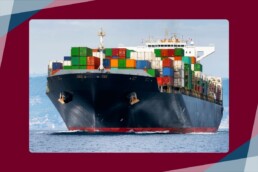5 Factors to Consider When Choosing Marine Insurance
The marine industry is bustling all around US ports and waterways with hundreds of ships making port each and every day.
These ships carry essential cargo to the States, so it’s important to make sure you have protections in place for both your commercial ship and your cargo if something goes wrong.
Read on to learn more about the ins and outs of marine insurance.
1. What Is Marine Insurance?
Marine insurance is a type of insurance policy specifically designed for marine vessels, but you might be surprised to learn it covers more than just the physical vessel.
Typically marine insurance covers the following, including:
- Ships
- Cargo
- Terminals
- Transports
- Transfers of goods
Every marine policy is different, and the differences between policy offerings will depend heavily on your ship’s specifications including its size and build, the waterways you usually traverse, and the amount and type of cargo you carry.
2. Types of Marine Insurance
There are a few types of insurance you may need to be aware of to make sure you’re getting the best marine coverage. This is where you’ll want to work with an experienced insurance agent as they’ll understand the unique challenges and policy options you may encounter. Let’s look at three key marine insurance coverage options:
- Freight insurance is one type of coverage that explicitly covers the corporation. Marine vessels can lose freight in any number of ways while carrying it.
- Hull insurance covers the structural components, including the vessel’s hull and torso.
- Like any kind of moving vehicle, you want your vessels also to carry liability coverage. Liability will cover your ship colliding, crashing, or induced attacks.
Additional types of insurance include marine cargo insurance, machinery insurance, and P&I insurance coverage.
3. Marine Insurance Coverage
You need to make sure that your insurance coverage covers your marine vessel in several different ways so that you’re fully protected in case you face any damages or liability claims.
Coverage should include:
- Structural and physical damage to the vessel because of a collision
- Bodily injuries
- Damage to your boat’s property and the property on board other vessels
- Towing
- In-water assistance
- Gas delivery
Your coverage should also protect you from things like:
- Fire
- Explosions
- Collisions
- Overturning
- Getting stranded
This coverage may also need to apply if you face any issues while transporting goods. Remember, your liability insurance covers the goods while in transport.
4. What’s Not Covered Under Marine Insurance?
There are some things not typically covered in a marine insurance policy. These might include:
- Intentional loss
- Bankruptcy
- Poor packaging
- War
- Riots
- Civil unrest
- Liquidation
Just like any time there’s an insurance claim, your marine insurer would assess the claim and wouldn’t pay for any events connected to these events.
5. Additional Policy Options
As you look at your marine insurance coverage and consider insurance options, there are some additional options you might add to your policy. These include:
- Block Policy
- Fleet Policy
- Floating Policy
- Mixed Policy
- Port Risk Policy
- Single Vessel PolicyTime Policy
- Voyage Policy
- Valued Policy
- Unvalued/Open Policy
- Wager Policy
The best way to know if you need any additional types of coverage is to work closely with your insurance agent and be sure they know everything there is to know about your marine business.
Covering All Your Marine Insurance Needs
Marine insurance is unique because of all the ways you might need to be covered. You want to work with an insurer who does niche insurance to be sure they understand your unique needs.
To learn more about marine insurance or to evaluate your current policy, contact us today.
Related Articles
Everything to Consider When Picking NJ Manufacturer’s Insurance
Did you know that 53% of small businesses face lawsuits each year? As a manufacturing business, the best thing you can do to protect your company is to have…
A Complete Guide to Marine Insurance
The unfortunate truth is that anything can happen at sea. For instance, the ship carrying your cargo could collide with another vessel or a ship can catch…


